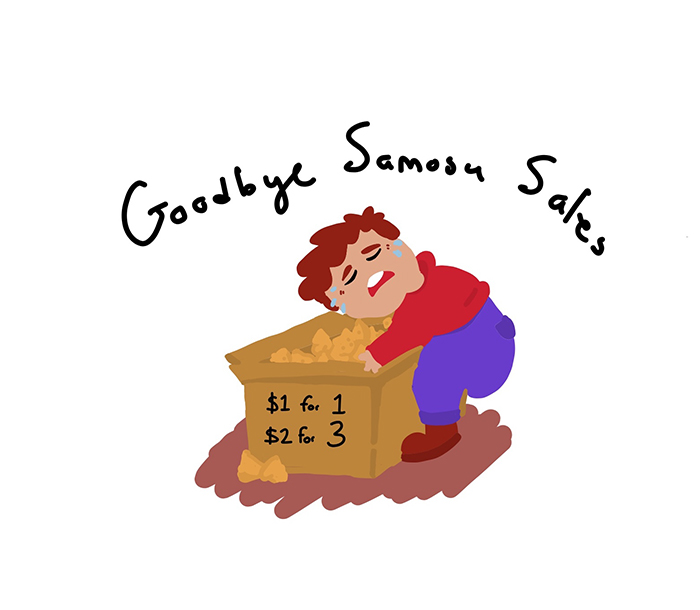Samosas sales, not midterms, seem to be what is now giving many McGill students a hard time. On Oct. 22, Montreal Inspection des Aliments issued a warning to the Students’ Society of McGill University (SSMU) due to sanitation concerns over a samosa sale in the basement of Burnside Hall. If health codes are violated again, a future fine could be anywhere in the range of $2,250 to $54,000. While seeing the indefinite suspension of the much beloved samosa sale is sad, SSMU’s failure to ensure that clubs met health standards is one that could prove costly. That being said, the general norms of food sales at McGill make SSMU’s negligence understandable, though not excusable.
In order for a student group to gain ‘club status’ and thus receive funding and approval for its various events, it needs direct confirmation from SSMU. Accordingly, SSMU oversees most student groups as it is the conduit for room-booking, ensuring student events can serve alcohol, and promote themselves at the annual Activities Night. Due to its heightened role in student group activities, SSMU’s negligence in educating groups about mandatory health and safety requirements for clubs to follow during food sales is irresponsible. Further, possible financial repercussions as well as the inability to fundraise properly could have extensive repercussions on student well-being.
It is possible that the samosa sale might have been organized without formal consultation with SSMU. Many student groups commonly hold sales to get a little extra revenue outside SSMU’s funding which they can use for upcoming events. As this is an intra-group activity that isn’t too elaborate, SSMU may well have been completely unaware that the sale was happening. However, the problem here is not that the sale occurred, or did so in the periphery of SSMU, but rather that SSMU has not adequately ensured that the student groups are aware of a health and safety procedure.
“SSMU’s negligence in educating groups about mandatory health and safety requirements for clubs to follow during food sales is irresponsible. Further, possible financial repercussions as well as the inability to fundraise properly could have extensive repercussions on student well-being.”
As one of the McGill Students for China Care executive members put it, “if we had known [about the rules], we would have followed them.”
In the aftermath of the autumnal samosa scandal, it is important to consider the short-term effect this sanction would have on SSMU, and by association, all the student groups that it oversees. Last academic year, SSMU adopted a more iron-fisted approach in maintaining rules and regulations for its member clubs. This resulted in the sanctioning of over 100 clubs, some of which expressed frustration in how suddenly the constraints were applied, which gave them little time to make necessary adjustments before being penalized. With this rather abrupt tightening of regulations, the failure to ensure that its clubs were aware of health and safety guidelines, especially having the bulk of the summer to consider and disseminate such information, makes SSMU’s oversight that much worse.
While it is encouraging that SSMU was prepared to cover a potential fine, that does not soften the reality that SSMU’s failure to inform student groups in this instance has caused a lot of apprehension within clubs over what other guidelines they may be actively breaching. It is also important that a deeper investigation goes into how day-to-day practices that are often glossed over can better fall in line with legal requirements. Student groups are given considerable autonomy to pursue various activities, and this ultimately serves to enrich the student experience here at McGill. The samosa ban may certainly increase cautiousness in how student groups operate from now on, but more importantly, it casts a spotlight on SSMU to ensure that it prevents similar lapses in the future.









